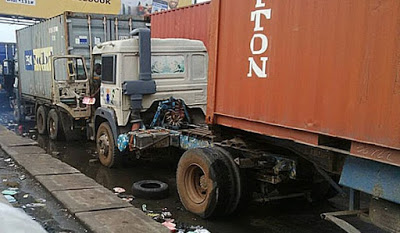Challenges begging for urgent fixes in Nigeria’s maritime sector
...Also, where are the quarantine centres at the ports?
The nation’s maritime industry status at any time would determine how healthy the sector is, bearing the fact that operations in the various sub sectors should be supported by conducive environment.
In that vein, some industry stakeholders have highlighted important issues in the maritime industry in Nigeria that demand urgent attention, to grant meaningful support to operations in such areas.
Touching on what he described as a key area for urgent attention, President of the Nigerian Association of Master Mariners, Capt. Tajudeen Alao, said: “Whoever is saddled with the responsibility must clear the port access roads. For commercial reasons, quick turnaround of ships, to address the frustration of truck operators and port workers, also, for security, and safety.”
Besides the man hour loss as trucks spend long hours, days or even weeks just to get into the ports, with its attendant economic loses, Alao pointed to the fact that should there be a fire outbreak as the ones involving tankers at different location in Lagos lately, there would be huge damage done.
He fears that if such happens, there would be loss of lives, considering how the trucks are usually lined up bumper-to-bumper.
While the situation, particularly along the Tin-Can Island Port area, seems to have defiled all attempted solution, different stakeholders including truck operators have blamed the problem on corrupt practices by persons and agencies put in place to manage the traffic situation.
Master mariner and ship owner, Capt Emmanuel Iheanacho, had in an earlier interview frowned on the practice of cargo degrouping in areas that leave the port access roads clogged with container trucks.
He had suggested the need for having marshalling areas, which would make it standard practice and save the ports the embarrassment of challenges in ease of moving in and out for prompt cargo movement.
On the continued attack on ships by pirates, Alao said Nigeria has the capacity for assembling patrol boats in the naval dockyard to ensure sustained security of the nation’s waters than allow private companies commercialise such important service.
“One thing that is so painful that we have not done is that, within six months we can assemble patrol boats in naval dockyard that we can put in our waters, they are not big war ships.
“But we find that people have capitalized on that and commercialized the whole area; security companies have been floated all over the place, patrol boats are being imported into Nigeria.
“The FG must protect the area where there are the oil and gas facilities- pirates are coming with new ideas. The estuaries leading to the creeks are open. Ships are still being escorted in and out of the Nigerian waters, and this adds to the cost of doing business,” Alao pointed out.
On the issue of crew change, Captain Alao confirmed that crew change still takes place in the nation’s ports, but with a lot of difficulties as shipping companies put people in hotels instead of a centre in the port, where such crew should quarantine for the required number of days.
In line with standard practice globally, the Nigerian Ports Authority (NPA) and the Nigerian Maritime Administration and Safety Agency (NIMASA) should provide such quarantine centres, but our findings reveal that it is a private operator, LADOL, that has a centre where crew can be quarantined for specific period of time, as part of efforts to check the spread of the coronavirus.
For manpower development, with cadet training by the Maritime Academy of Nigeria, Oron, stakeholders have over time drawn attention demanding for a sustainable structure to enable the cadets get sea time training.
But, considering the Standards of Training, Certification and Watch-keeping (STCW), which demands minimum requirement of seagoing service to qualify cadets as global-standard seafarers, stakeholders have continued to urge that NIMASA make efforts to support the cadets get international seatime as it does for trainees of the Nigerian Seafarers Development Programme(NSDP).
With respect to the sea time on ocean-going ships, the master mariners’ president said that “So much energy is put in to place the NSDP cadets on board ships for sea time, and I believe the same should be done for the cadets from the Maritime Academy of Nigeria, Oron.
“This Academy is out pride, and the way forward is to take cadets from the academy and put them 50-50 for international sea time training.”
Although sources at NIMASA disclosed that the NSDP cadets go onboard international seagoing vessels, as they are trained outside the country, NIMASA facilitates placement of the cadets trained in Nigeria on board Cabotage vessels.
For the above, Captain Alao argues that “When somebody is trained for inland waters, they cannot go to coastal, and when you train somebody for coastal, they cannot go to international waters.”
In fact, master mariners including Captains Alao, Adewale Ishola, and Fola Ojutalayo had in an opinion poll in 2018 supported that cadets should be trained in the nation’s academy, while seatime on board ocean-going vessels can be sought for them.

